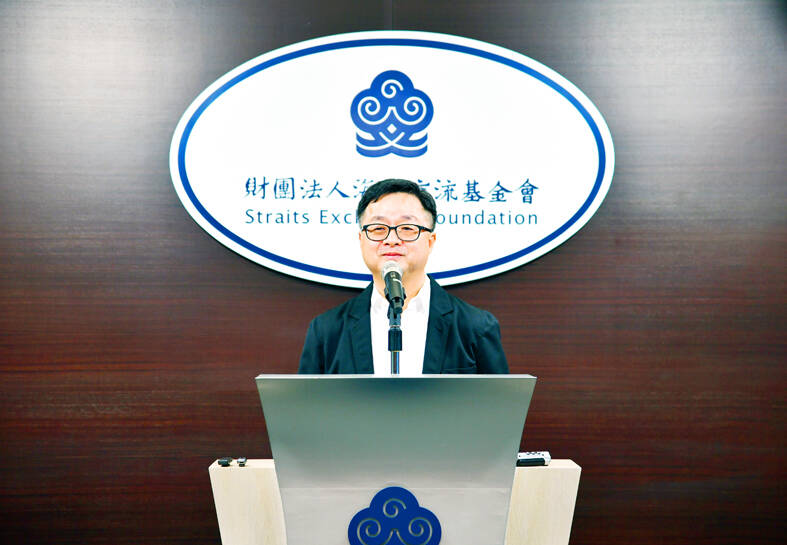The Straits Exchange Foundation (SEF) on Friday issued a warning to students intending to study in China to be wary of people offering “campus loans,” as Chinese students who took out the loans and were unable to pay them back are reported to have faced coercion and even forced to provide nude photographs as debt repayments.
SEF Secretary-General Luo Wen-jia (羅文嘉) said the program attempts to attract students by saying the loans would be low-interest and provided quickly.
However, the real interest rate could be as much as 200 percent, he said.

Photo courtesy of the Straits Exchange Foundation
The foundation, a quasi-official intermediary body authorized by the government to negotiate matters of a technical or business nature with China, warned students last week about the campus loans at an orientation meeting for students about to begin studying in China.
The event also invited former and current Taiwanese students in China to provide new students with more information on living in China.
On Friday, Luo said that students about to begin their studies in China should be wary of people offering such loans.
Students should avoid taking out loans from unknown individuals or organizations online, he added.
Separately, Luo cited data from South Korea’s Custom’s Service which showed that over the past four years, the number of Chinese-made goods, including stationery, clothing, toys and accessories, containing harmful substances imported into South Korea has increased significantly.
The data showed that more than 30 percent of the 83 items inspected contained residual amounts of heavy metals that far exceeded South Korean standards and could cause serious harm to people’s physical health.
The SEF also cited an incident of a 10-year-old girl in the UK who was severely burned after using nail polish sold on a Chinese e-commerce platform, and a case in Japan where a person developed necrosis after they used an ointment advertised to be a mole remover, which they also purchased from a Chinese e-commerce platform.
Luo said these incidents are a reminder for Taiwanese to be cautious when purchasing items from Chinese e-commerce platforms, especially cheap products.
The SEF has received multiple complaints in recent years about Chinese platforms, such as false advertisements, paying for products that are not delivered and receiving faulty products, he added.
It is difficult to receive compensation, as such platforms do not offer systematic guarantees for their customers, but the SEF would continue to help those who have encountered issues with their purchases, he said.

South Korean K-pop girl group Blackpink are to make Kaohsiung the first stop on their Asia tour when they perform at Kaohsiung National Stadium on Oct. 18 and 19, the event organizer said yesterday. The upcoming performances will also make Blackpink the first girl group ever to perform twice at the stadium. It will be the group’s third visit to Taiwan to stage a concert. The last time Blackpink held a concert in the city was in March 2023. Their first concert in Taiwan was on March 3, 2019, at NTSU Arena (Linkou Arena). The group’s 2022-2023 “Born Pink” tour set a

CPBL players, cheerleaders and officials pose at a news conference in Taipei yesterday announcing the upcoming All-Star Game. This year’s CPBL All-Star Weekend is to be held at the Taipei Dome on July 19 and 20.

The Taiwan High Court yesterday upheld a lower court’s decision that ruled in favor of former president Tsai Ing-wen (蔡英文) regarding the legitimacy of her doctoral degree. The issue surrounding Tsai’s academic credentials was raised by former political talk show host Dennis Peng (彭文正) in a Facebook post in June 2019, when Tsai was seeking re-election. Peng has repeatedly accused Tsai of never completing her doctoral dissertation to get a doctoral degree in law from the London School of Economics and Political Science (LSE) in 1984. He subsequently filed a declaratory action charging that

The Hualien Branch of the High Court today sentenced the main suspect in the 2021 fatal derailment of the Taroko Express to 12 years and six months in jail in the second trial of the suspect for his role in Taiwan’s deadliest train crash. Lee Yi-hsiang (李義祥), the driver of a crane truck that fell onto the tracks and which the the Taiwan Railways Administration's (TRA) train crashed into in an accident that killed 49 people and injured 200, was sentenced to seven years and 10 months in the first trial by the Hualien District Court in 2022. Hoa Van Hao, a